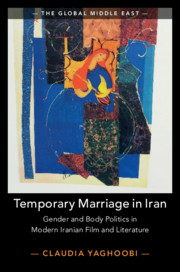Book contents
- Temporary Marriage in Iran
- The Global Middle East
- Temporary Marriage in Iran
- Copyright page
- Dedication
- Contents
- Acknowledgments
- Note on Transliteration, Dates, and Translation
- Prologue
- Part I General Overview
- Part II Representation of Sigheh/Sex Work in the Literature of the Pahlavi Era
- Part III The Islamic Republic and Sigheh in the Film Industry
- 7 Whose Body Matters in Afkhami’s Showkaran
- 8 Politics, Power, and Embodiment in Farahbakhsh’s Zendegi-ye Khosusi
- Epilogue
- Bibliography
- Index
7 - Whose Body Matters in Afkhami’s Showkaran
from Part III - The Islamic Republic and Sigheh in the Film Industry
Published online by Cambridge University Press: 13 January 2020
- Temporary Marriage in Iran
- The Global Middle East
- Temporary Marriage in Iran
- Copyright page
- Dedication
- Contents
- Acknowledgments
- Note on Transliteration, Dates, and Translation
- Prologue
- Part I General Overview
- Part II Representation of Sigheh/Sex Work in the Literature of the Pahlavi Era
- Part III The Islamic Republic and Sigheh in the Film Industry
- 7 Whose Body Matters in Afkhami’s Showkaran
- 8 Politics, Power, and Embodiment in Farahbakhsh’s Zendegi-ye Khosusi
- Epilogue
- Bibliography
- Index
Summary
In Chapter 7, I examine Behruz Afkhami’s Showkaran (Hemlock, 2000), set in 1995. Showkaran depicts Mahmud, a happily married man who finds himself stuck at the junction of religiosity and modernity. Afkhami exposes some key social problems, including sigheh marriages, and how religious regulations are used as a façade to justify social injustice. He sheds light on the double standards that dominate sigheh marriages and dramatizes how the political becomes personal as individuals strive for morality. Through the character of Sima, Afkhami pushes back against the social and moral corruption of the time, which is mapped onto a woman’s body that must ultimately be eliminated. By highlighting the role of sigheh marriages in maintaining the precarious balance of religiosity and modernity, the manipulation of religion, the societal and religious double standards imposed on women, marriage as an institution versus an intimate relationship, and politicization of the personal, Afkhami displays the complex aspects of sigheh marriages and the detrimental effects the practice has particularly on the personal lives of women, but also on society as a whole. Afkahmi portrays Sima who is “socially peripheral” as “symbolically central,” for she poses a grave threat to Mahmud's nekah marriage, and therein lies her power.
Keywords
- Type
- Chapter
- Information
- Temporary Marriage in IranGender and Body Politics in Modern Iranian Film and Literature, pp. 203 - 223Publisher: Cambridge University PressPrint publication year: 2020

